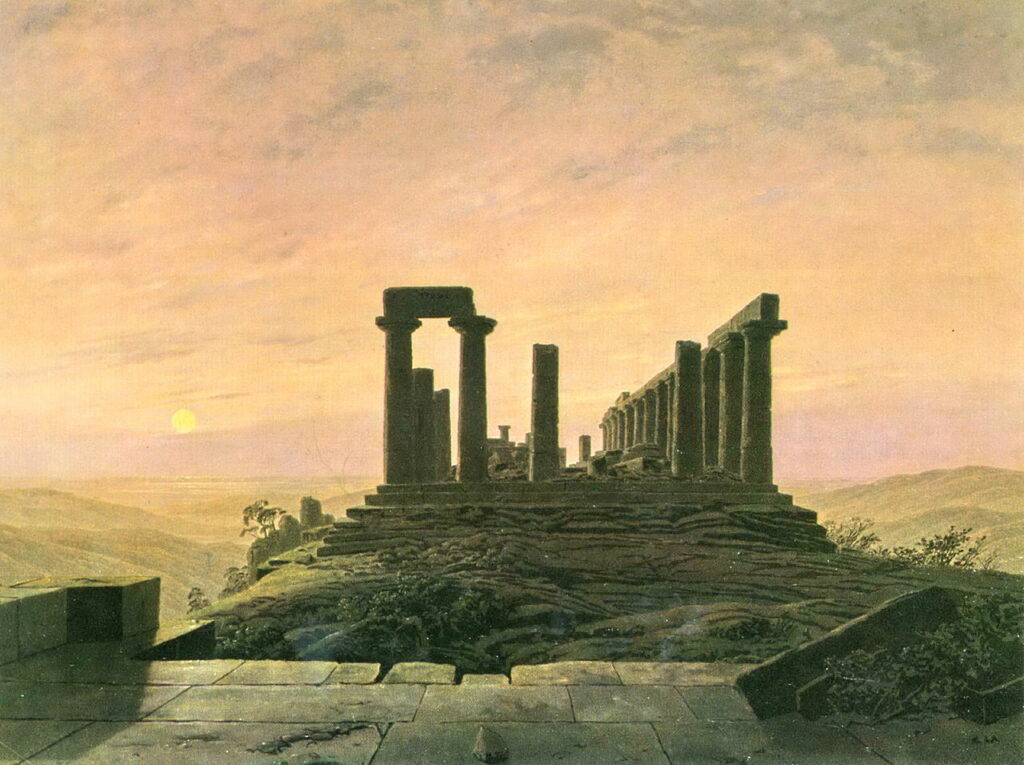Helen, thy beauty is to me
Like those Nicean barks of yore
That gently, o'er a perfumed sea,
The weary, way-worn wanderer bore
To his own native shore.
On desperate seas long wont to roam,
Thy hyacinth hair, thy classic face,
Thy Naiad airs have brought me home
To the glory that was Greece,
And the grandeur that was Rome.
Lo, in yon brilliant window-niche
How statue-like I see thee stand,
The agate lamp within thy hand,
Ah! Psyche, from the regions which
Are Holy Land!
Edgar Allen Poe, To Helen, 1845
The sea is calm tonight.
The tide is full, the moon lies fair
Upon the straits; on the French coast the light
Gleams and is gone; the cliffs of England stand,
Glimmering and vast, out in the tranquil bay.
Come to the window, sweet is the night-air!
Only, from the long line of spray
Where the sea meets the moon-blanched land,
Listen! you hear the grating roar
Of pebbles which the waves draw back, and fling,
At their return, up the high strand,
Begin, and cease, and then again begin,
With tremulous cadence slow, and bring
The eternal note of sadness in.
Sophocles long ago
Heard it on the Ægean, and it brought
Into his mind the turbid ebb and flow
Of human misery; we
Find also in the sound a thought,
Hearing it by this distant northern sea.
The Sea of Faith
Was once, too, at the full, and round earth’s shore
Lay like the folds of a bright girdle furled.
But now I only hear
Its melancholy, long, withdrawing roar,
Retreating, to the breath
Of the night-wind, down the vast edges drear
And naked shingles of the world.
Ah, love, let us be true
To one another! for the world, which seems
To lie before us like a land of dreams,
So various, so beautiful, so new,
Hath really neither joy, nor love, nor light,
Nor certitude, nor peace, nor help for pain;
And we are here as on a darkling plain
Swept with confused alarms of struggle and flight,
Where ignorant armies clash by night.
Matthew Arnold, Dover Beach, 1867
☙
Descendant of:
MYTHOLOGY AND THE CLASSICAL WORLDTexts with this theme:
- Amphiaraos, D 166 (Theodor Körner)
- Hektors Abschied, D 312 (Friedrich von Schiller)
- Hermann und Thusnelda, D 322 (Friedrich Gottlob Klopstock)
- Klage der Ceres, D 323 (Friedrich von Schiller)
- Lied eines Schiffers an die Dioskuren, D 360 (Johann Baptist Mayrhofer)
- An Schwager Kronos, D 369 (Johann Wolfgang von Goethe)
- Die vier Weltalter, D 391 (Friedrich von Schiller)
- Gruppe aus dem Tartarus, D 65, D 396, D 583 (Friedrich von Schiller)
- Die Liebesgötter, D 446 (Johann Peter Uz)
- Fragment aus dem Aeschylus, D 450 (Aeschylus and August Lafontaine)
- Lied des Orpheus, als er in die Hölle ging, D 474 (Johann Georg Jacobi)
- Leiden der Trennung, D 509 (Pietro Metastasio and Heinrich Joseph von Collin)
- Fahrt zum Hades, D 526 (Johann Baptist Mayrhofer)
- Philoktet, D 540 (Johann Baptist Mayrhofer)
- Memnon, D 541 (Johann Baptist Mayrhofer)
- Antigone und Oedip, D 542 (Johann Baptist Mayrhofer)
- Ganymed, D 544 (Johann Wolfgang von Goethe)
- Orest, D 548 (Johann Baptist Mayrhofer)
- Uraniens Flucht, D 554 (Johann Baptist Mayrhofer)
- Iphigenia, D 573 (Johann Baptist Mayrhofer)
- Atys, D 585 (Johann Baptist Mayrhofer)
- Elysium, D 51, D 53, D 54, D 57, D 58, D 60, D 584 (Friedrich von Schiller)
- Sonett (Apollo, lebet noch dein hold Verlangen), D 628 (Francesco Petrarca and August Wilhelm Schlegel)
- Prometheus, D 674 (Johann Wolfgang von Goethe)
- Strophe aus “Die Götter Griechenlands”, D 677 (Friedrich von Schiller)
- Der entsühnte Orest, D 699 (Johann Baptist Mayrhofer)
- Der zürnenden Diana, D 707 (Johann Baptist Mayrhofer)
- Grenzen der Menschheit, D 716 (Johann Wolfgang von Goethe)
- An die Leier, D 737 (Anacreon, Johann Friedrich Degen, and Franz von Bruchmann)
- Heliopolis I, D 753 (Johann Baptist Mayrhofer)
- Heliopolis II, D 754 (Johann Baptist Mayrhofer)
- Dithyrambe, D 47, D 801 (Friedrich von Schiller)


